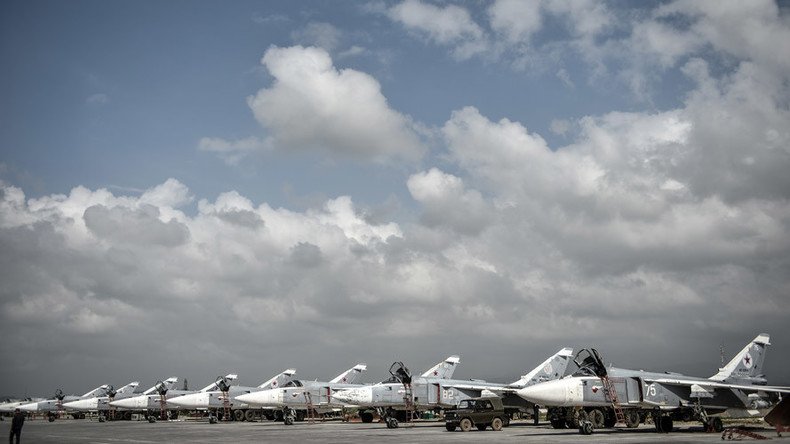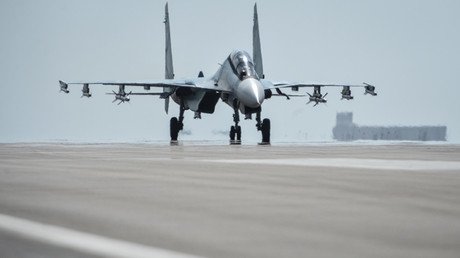Syria turning point: Russia withdraws to play the most of ‘diplomatic card’

The announced partial withdrawal from Syria does not mean Russia is backing away from fighting Islamic State, but rather marks a turning point in the process of stabilizing Syria, which could not come at a better moment, believes former CIA officer Larry Johnson.
RT: Do you think the Russian forces have accomplished their mission in Syria?
Larry Johnson: No, not yet, but what is important to note is that there is no specific timeline, nor a specific identification of which forces are going to get withdrawn and when. It is more of a commitment: ‘Okay, we now see this s a turning point.’
And I think this is an appropriate time for a turning point. Because what we have seen over the last two weeks is that military operations, especially against the rebels and ISIS [Islamic State, formerly ISIS/ISIL] and Al-Nusra have advanced very rapidly. Syria has retaken large loss of territory. We’ve seen also reports come out now acknowledging and accepting what Russia asserted almost three years ago, which was that ISIS and Al-Nusra were manufacturing and using chemical weapons. And it was not the government’s hysteria and that it was these radical Islamists.
With that you are seeing support now for the Russian position around the world and particularly in Europe, that was not the case three months ago, four months ago. Remember Barack Obama so arrogantly insisted that Russia would fail in its mission. Instead of failing, Russia is succeeding and is leaving Bashar Assad in a position to really negotiate for more strength, particularly as some of these rebel groups decide they no longer have the stomach to go out, and bleed, and die.
RT: Does this withdrawal mean that the Syrian military is now capable of defeating the terrorists?
LJ: No. It is important to note that Russia is still going to maintain an airbase and a naval base and they will be able to provide full support to the Syrian army, as well along with Iran continuing its operations and Hezbollah.
Only alternative to #Syria peace talks is ‘even worse war’ – #de Mistura https://t.co/8xtUubHEcRpic.twitter.com/DuJcVdTaQA
— RT (@RT_com) March 14, 2016
So this war is not over, but it clearly has entered into a different phase. What I think Putin is effectively doing is playing a diplomatic card, as symbolic gesture of: “Okay, we will start withdrawing our forces.” But it is important to note, he did not commit to which forces, he did not commit to where they will be withdrawn from, he did not commit to say that “we're going to stop bombing these targets once they become available.”
#Putin orders start of Russian military #withdrawal from #Syria, says ‘objectives achieved’ https://t.co/t5EadbW422pic.twitter.com/P34XSuhiva
— RT (@RT_com) March 14, 2016
Frankly I'm pretty impressed by it. He has been able to allow Russia to be perceived globally as working towards peace with diplomatic measures while still retaining the options of conducting military operations.
RT: Russia’s permanent air and naval bases will continue to operate. Do you think it is possible that Russian warplanes will start bombing ISIS militants again if Syrian President Bashar Assad fails to defeat them? We also note that Russia will be working with the US – will there be continued coordination there?
LJ: I hope that what we are seeing is some genuine change on the part of the United States to finally embrace what it is that Russia has been doing. Because you cannot defeat a force like ISIS simply with air power. Russia understood that, the US did not. We have now seen that the US after two years of denial insisting we’re not going to put boots on the ground in fact have agreed to put boots on the ground in the person of special operations forces. And this is not just train and advise but also to conduct offensive missions. So that is the change on the part of the United States. So this concerted effort I think is going to continue to squeeze ISIS.
War on #ISIS: Russia’s #Syria anti-terror op in 10 intense videos https://t.co/8AFRwpvvBKpic.twitter.com/jVkrwZ1Ha2
— RT (@RT_com) March 15, 2016
Part of the reason I think we saw this terrorist attack in Turkey last night was ISIS in its death row lashing out. And the irony here is that Turkey had basically picked them up like a pet scorpion, fed them, watered them, enabled them, and now Turkey itself has been stung by that same scorpion. I think at least we are seeing a de facto consensus that ISIS has got to be destroyed and its destruction militarily is going to have to be continued. I do not see Russia backing away from that.
RT: Does this withdrawal mean that the peace process in the country is working?
LJ: Yes it is starting to work because you are having a military victory. This is not going to get achieved because the people are going to get into a group hug and sing Kumbaya. This is being achieved because the rebel groups that were supposed to fight Assad have failed – that are considered secular. And the groups that have been most aggressive in trying to fight, destroy the government of Bashar Assad, have been the radical Islamists and they are taking a terrible beating.
‘Russia changed Syria conflict dynamics’ – Pan-African News Wire editor
The current situation in Syria provides “more promise for some type of political settlement” to the conflict than it was six months ago prior to intervention by Russia,” believes Abayomi Azikiwe, an editor of the Pan-African News Wire.
“The air campaign has changed the whole dynamics of the situation in Syria, throughout the entire Middle Eastern region. And this is a very very positive development as far as international peace is concerned,” Azikiwe told RT. “We have seen in the last two weeks as successful cessation of the hostilities. The situation in Damascus and other parts of the country is far different today than it was in September of last year.”
Russia’s ‘surprise & unexpected’ #Syria withdrawal welcomed as signal for ‘true peace’ https://t.co/DkChccoHchpic.twitter.com/qnZEGqLlaf
— RT (@RT_com) March 15, 2016
“The results of [the Russian strikes] have been enormous,” he added. “They have been able to destruct the supply lines, a lot of the economic bases for the strength of the Islamic State and other armed opposition groups to president Bashar Assad. They have been heavily degraded. So therefore the process is well underway in reestablishing Damascus as the central authority inside the Syria itself.”
“We also have to acknowledge the fact that there is an effort for a comprehensive political settlement. Now whether or not that is going to be realized has a lot to do with the role of the US, of Britain, as well as these armed opposition groups inside of Syria itself… This is going to put pressure particularly on the United States, on Britain and on NATO countries to come up with some type of compromised agreement,” Azikiwe said.
‘It was clear Russia's participation in Syria would not be permanent’ – Ex-Pentagon official
Russia’s participation in the Syrian conflict was never intended to be a “permanent thing” and a nearly six-months period “seemed reasonable” to help Syrian government to “regain control over the area” and get rid of terrorists, former Pentagon official Michael Maloof told RT.
“It gives, however, a de-facto recognition of partition of Syria],” he noted. “It does secure the Western portion for [Bashar] Assad. Northern part goes for the Kurds. It really doesn’t do that much to take ISIS [Islamic State] in the eastern portion [of Syria].”
Maloof added that withdrawal of Russian troops from Syria was “a good tactical move in terms of trying to get the peace process underway.”
“If…Turkey and Saudi Arabia are going to take advantage of that [withdrawal] or want oust Assad, then all bets are off,” Maloof added.
The statements, views and opinions expressed in this column are solely those of the author and do not necessarily represent those of RT.














